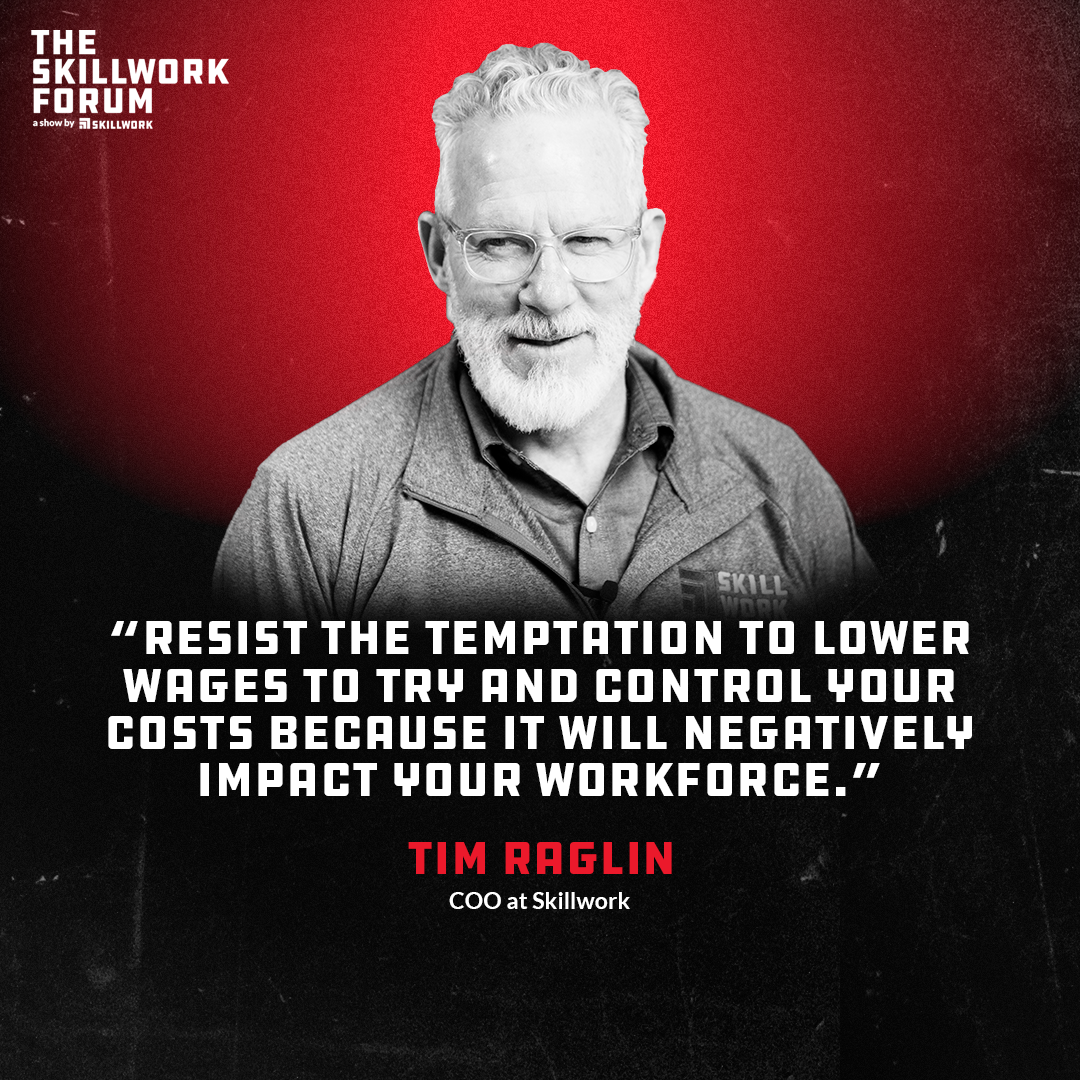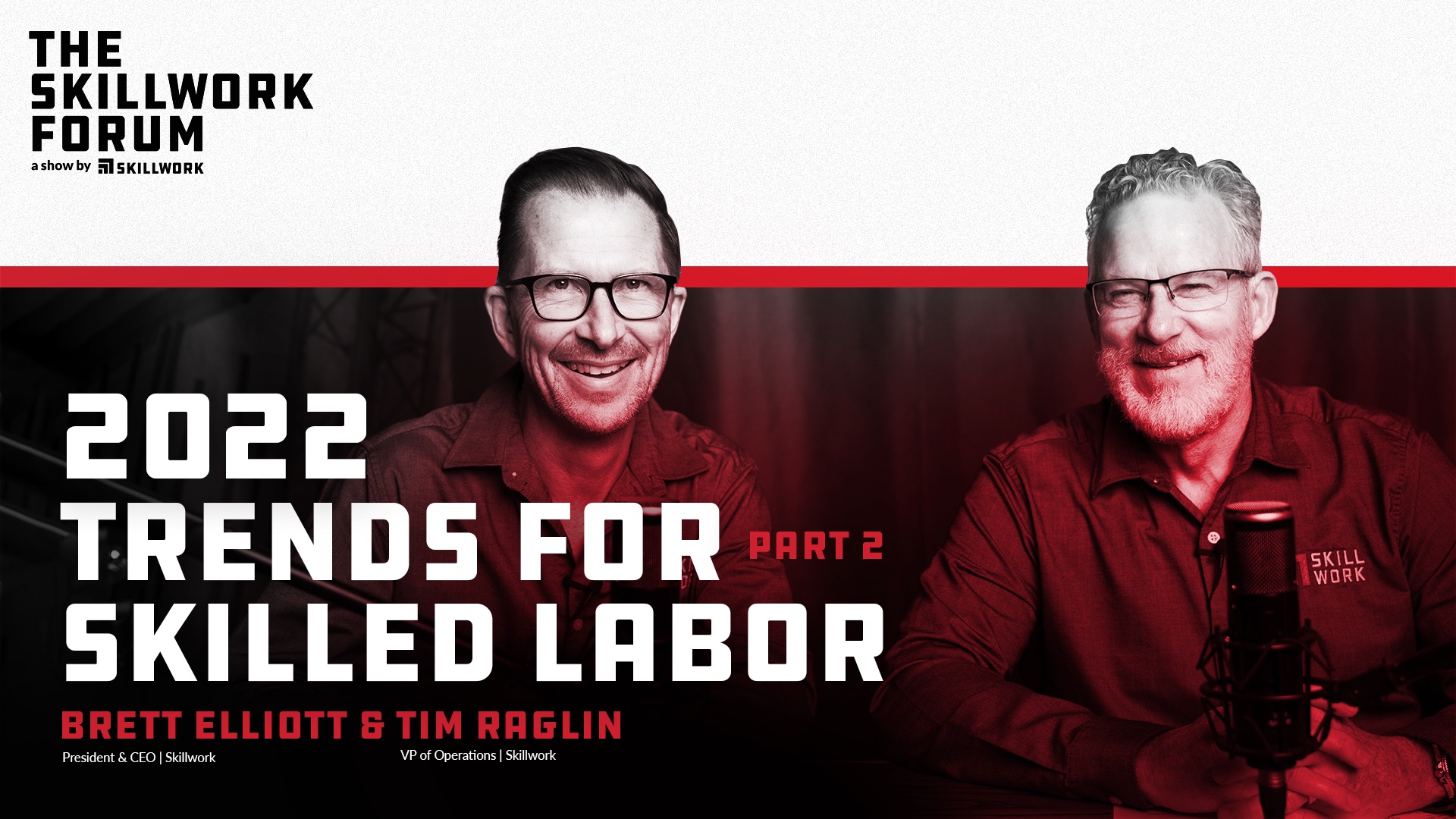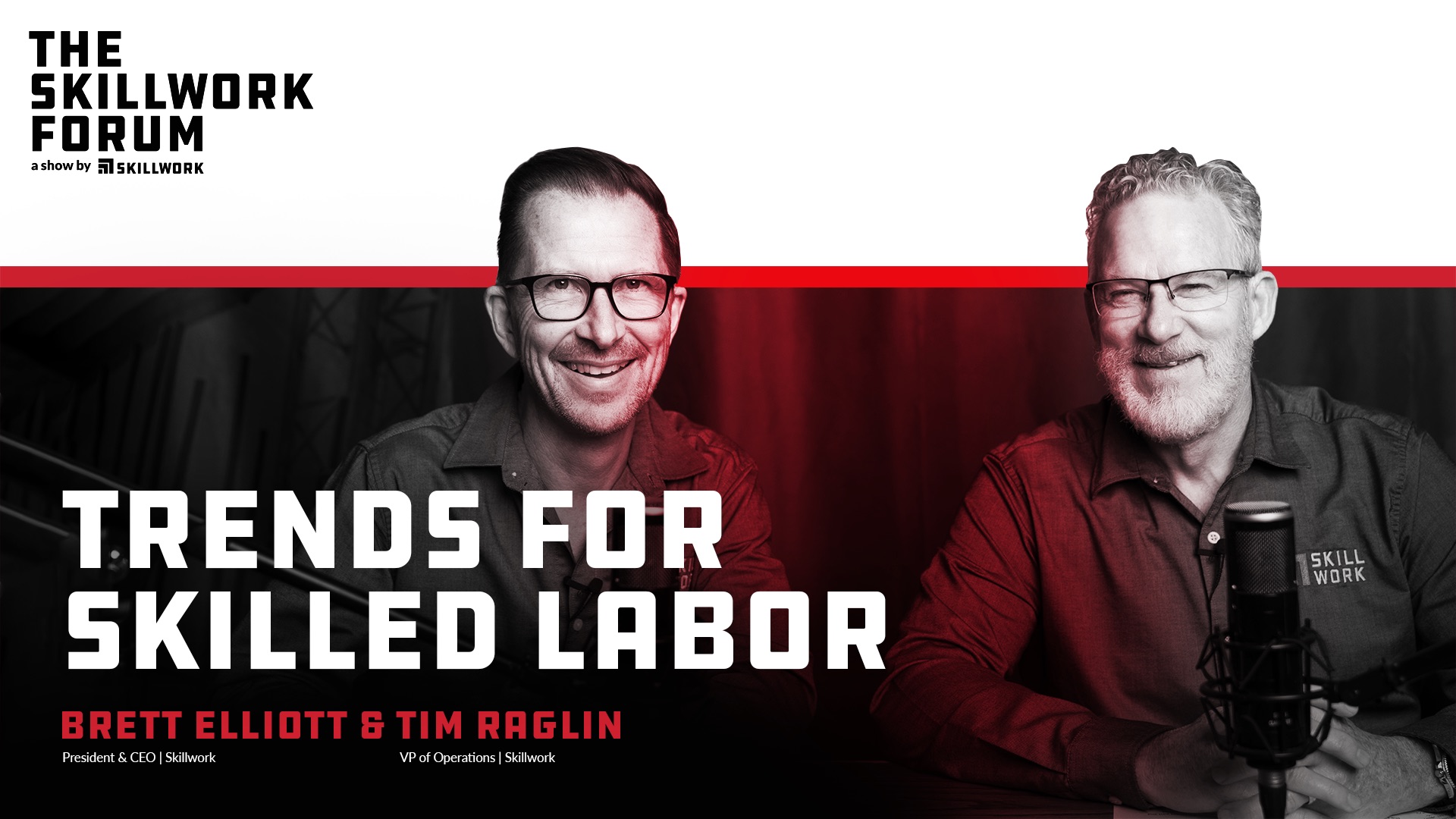Inflation Impact On The Skilled Trades
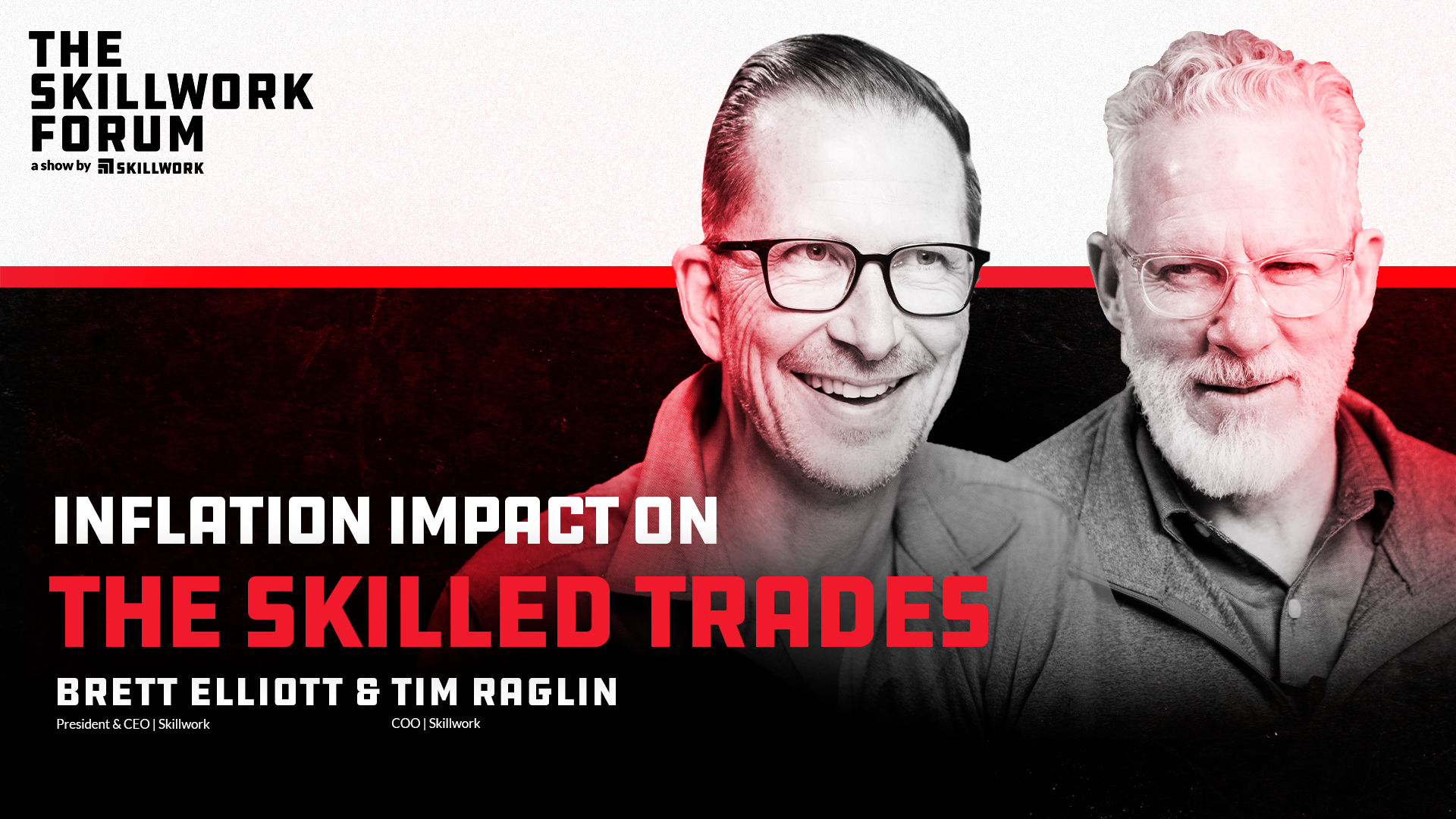
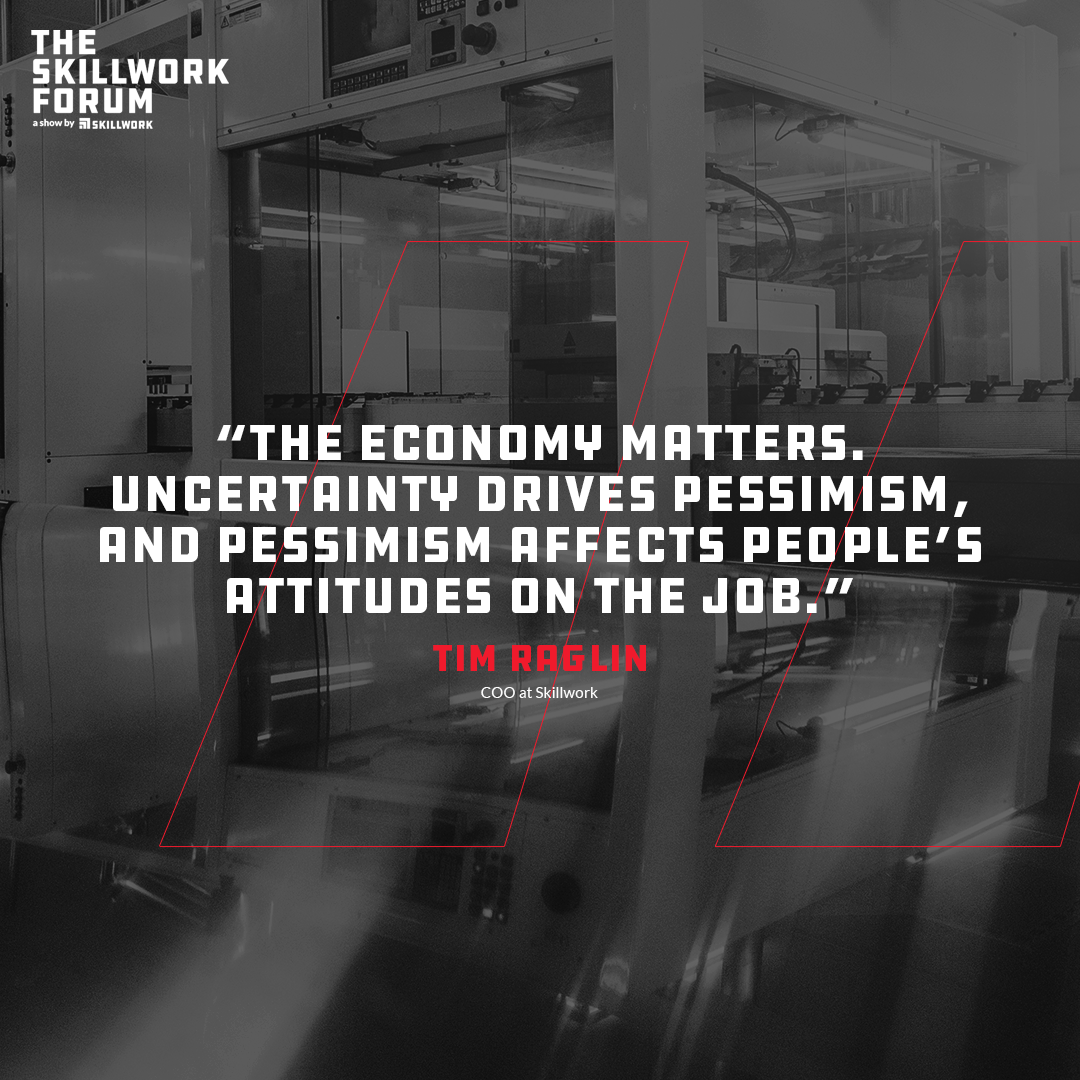
Full Transcription:
Tim Raglin 00:08
Hello, and welcome again to The Skillwork Forum. I'm Tim. And as always, I'm joined with my partner here, Brett, we gather on these podcasts to talk about trends, issues, concerns, really surrounding the skilled trades and those industries that leverage and use and depend on skilled tradesmen. So today, we're going to have a very cheery topic, we thought we'd just cheer everyone up. And we're going to be talking about the current economic pressures, the inflationary impacts, really to industry and all of us that are living in it and some of the things that perhaps we can do, and really just take a pulse of the current economic trends and impacts that we're all living in right now, particularly with how they impact skilled trades, labor, and that whole gap that we always talk about here on the podcast. So just to kind of tee things up: in general, you know, prior to our friend over there, Vladimir Putin's invasion and excursion into Ukraine, which will impact things, we'll talk about that in more detail, but the economy really was still under a lot of stress. But things were beginning to look hopeful, you know, if you look at some of the indicators to the pressures from the pandemic, kind of the post-pandemic balance was beginning to, we were beginning to see signs that economic recovery was underway, and that the peak impact from the pandemic had, we were kind of on an uphill growth pattern, which is great. Inflation had already begun to creep up, though we were seeing inflation was there, as a matter of fact, October of '21, was 6.2%. And by January was already up to seven and a half percent. But everybody kind of thought that we could normalize inflation, it could be something that was a normal trend that we could manage it to, you know, the normal levers that we talked about.
Brett Elliott 02:01
Yeah, no we were starting to see, you know, obviously, there's huge demand, you know, in the supply channels, and so, you know, the the labor numbers, you know, the jobless claim numbers were, you know, had just hit an all time low, or not an all time low, but a low since the 70s. So, like you said Tim, while there was inflation pressure that was, was coming, and there were some other things that were going on, there were some signs that the last two years of what we've experienced with COVID, that we were getting people back to work, and there was some positive signs and those things.
Tim Raglin 02:37
Yeah, so you know, it was, the trend was good. A lot of positivity, optimism, we talked about our trends for this year. There's a lot of things that you know, that we believed, you know, these, especially with the unemployment figures coming, that things were going to improve on some fronts, but then the proverbial, you know what hit the fan overseas. Russia decides to invade Ukraine, it triggers this incredible financial and economic conflict across the globe, really proving that we are in a global economy here. And then everything is interconnected. I mean, you have Russia invade Ukraine, and then two days later, I'm paying 75 cents more for gas, or maybe not two days, but it seemed like it happened overnight. So it really was a huge impact on things.
Brett Elliott 03:27
Oh, no doubt. I mean, you know, the current administration, you know, their, their position on energy independence, you know, came to roost really fast. When you're getting, you know, a lot of your oil from overseas, and those things start to happen, like you said, the impact. So now you've got a situation where you know, where you're already seeing inflation creep up, we're seeing wage costs start to creep up a little bit, we're seeing cost of food start to creep up a little bit and the inflation, and then like you said, Tim, all of a sudden, to, it hit home or the groceries hits home, too. Yeah, you know, but when all of a sudden you pull up to fill up your truck and what used to cost $50 costs $75. You know, that's, that's significant, you know, and so I know here, you know, we were fortunate we live, we're in Nebraska, and while our gas went way up too, you know, we were not as high as some parts, I think we were in the in the bottom 10 I think right now, gas is $3.70 or something like that, which is still really high, considering where it was, you know, a couple years ago, but you know, I think the average was well over $4 and continues to be well over $4.
Tim Raglin 04:51
Yeah, so it impacted everything. I mean, I just got back from a little road trip, and you notice along the way that the prices were up not only for gas, but just everything, you know, stop and get a, you know, quick bite to eat on the way, and it's like, what the heck? I mean, I don't frequent those kind of places often, but it was startling how much it really was. So this soft recovery that we thought we were in now seems to be threatened. So this bring a lot of questions. And we just thought, you know, we're not economists, we're business owners, we try to run a business, but we all live in it, and it's important for us to take a look at some of these things and how it impacts us. So we've, we've kind of tried to take a look at some of these things, and maybe some questions like: will there be more inflation? Are oil and gas prices going to continue to go higher? And when you see this podcast and gas prices have kind of moderated a little bit, but it's still above what it was 18 months ago, even a year ago. So no one knows these things for certain, like, are we heading into a recession? Some people have talked about that, are we heading into a recession, or maybe even, you know, hyperinflation, both ends of the spectrum there, but it's important for us to assess what we do know. And, you know, how does it affect you, and particularly your current labor and some of the recovery headwinds in that particular area of focus?
Brett Elliott 06:17
Yeah, I mean, if we want to kind of, you know, start to kind of pull it back in to, to where we would consider ourselves to maybe have a little more expertise than we do in the economy. You know, the reality, I was just talking to my son and daughter-in-law the other day, and they said, you know, these $600 trips to Costco are not sustainable. Know what, you know, what used to cost them, you know, it was still, you know, probably 300 or 400 bucks, you know, is that. So to a family with kids, you know, the think grocery costs are up about 7%, you know. To go out and buy a vehicle, I was talking to somebody the other day, and they said literally where they normally would have 500 cars on the lot I think they had less than 50. So what does that do? Well, that means the cost of, though they're not coming off sticker price anymore, you know, so, cost of cars, you know, you know, are up anywhere from 12 to 40%. You know, we talked about gas, and the immediate impact we saw on that, you know, gas is up 40%. You know, I think nationally for those that are renting, in today's crazy real estate market, you know, my wife's a realtor, as you know, Tim, and, you know, just the real estate market, not just here in Omaha, but everywhere is, is crazy, which is keeping a lot of first time homebuyers in the rental market, and rent is up somewhere around 14%, you know, nationally. So you start to add up all of those numbers, and, you know, a traditional or a typical wage increase, you know, you get to the end of 2021, and you look at your employees, and you go okay, well, the standard is about a 3% increase. Well, you've now, you know, you're spending more than what you got. And so, those types of things start to impact a lot of areas on, you know, the wages and these facilities, you know, the folks that we really target this audience to mostly, you know, business owners are running these businesses. This impact, this pressure of these costs is going to push down into your business, and in a variety of ways, and already a very tight labor market.
Tim Raglin 08:36
Yeah, I mean, it's the wage increases have basically been wiped out. And you're, you're actually going backwards. And, you know, intuitively, people feel that, although, you know, they may not look at all these specific things, but they know it. And that means it's going to be a big impact to some of your skilled craftsmen, your tradesmen, the people that you depend on to run your businesses. And it's a matter of fact, it's even a much bigger impact to middle or even lower income earners. So your workers, and the people that we deal with, their logical conclusion is going to be, "hey, I need more pay to compensate. I need to find a job that pays better, this raise that I just got seemed good and at the time, but it's not. It's nice, but it's not get me where I need to be." As matter of fact, those that have collective bargaining agreements with labor unions and so forth, they're actually bringing inflationary pressures and tying their negotiations to that and a lot of new and ongoing labor negotiation. So bottom line is you got to pay attention to the inflationary impact on your skilled trade gap.
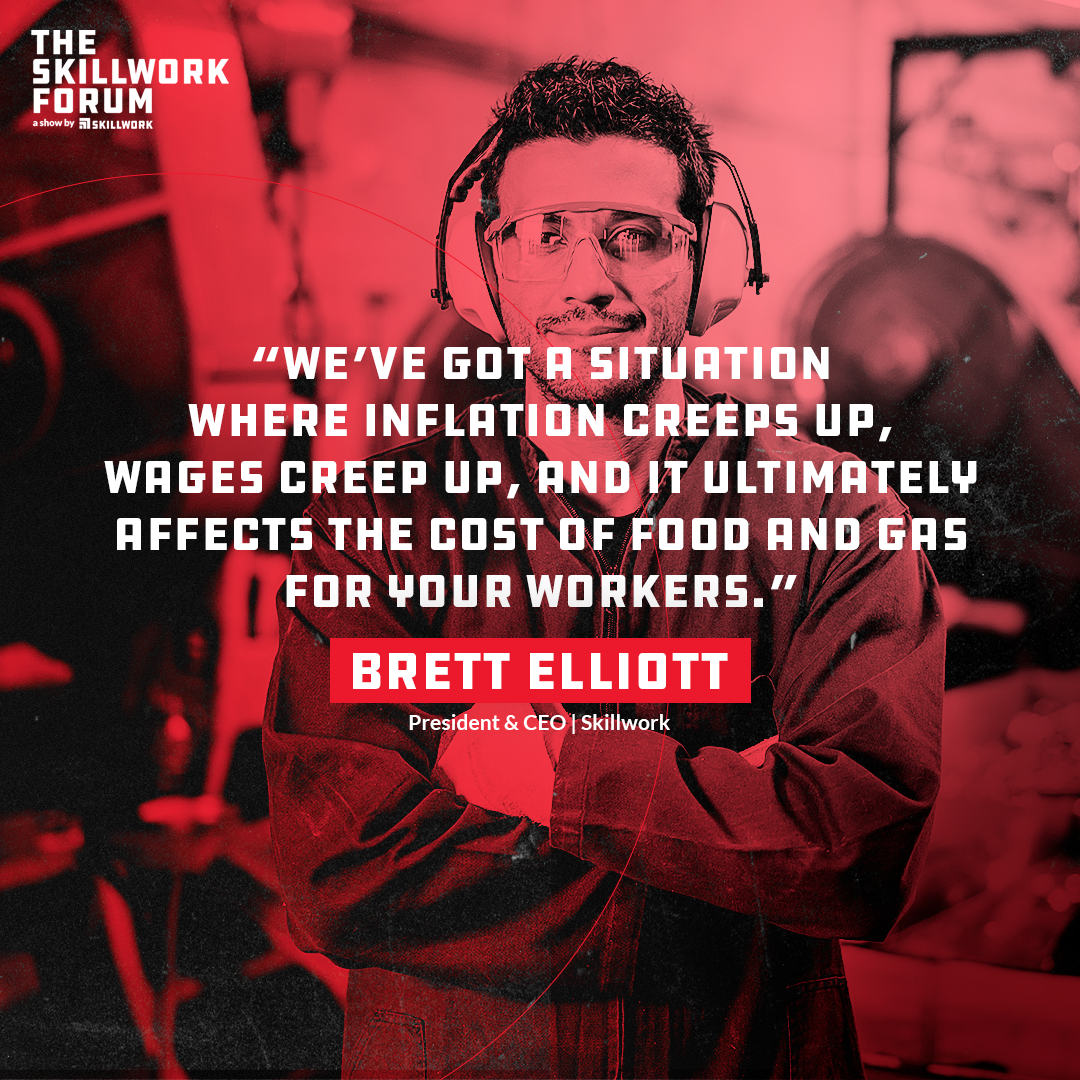
Brett Elliott 09:45
Well, I think to your point, Tim, you know, we talk about it a lot because it's the reality. The talent pool, and specifically the skilled trades talent pool is very tight. It's very thin. We're not telli ng any of you anything you don't already know, you're experiencing that. And so now, where, as you, you have this baby boomer exodus that we've talked about for a long time, you know, the 10,000 baby boomers that are reaching the age of retirement per day. And that will continue for the next 10 years. Now, obviously, not all 10,000 of them are in the skilled trade space. But a lot of, I was just at a client yesterday, and I was walking the shop with them, and I commented to the guy, I said, "You know, you've got some pretty seasoned guys here." Which was,
Tim Raglin 10:42
What people say to us, you guys are seasoned!
Brett Elliott 10:45
And he looked at me like, you're right, you know, which meant, you know, they're not going to, you know, how much longer are they going to work. And so that's that baby boomer exodus that we talked about. So you've already got this, really, you've got an exodus, everybody's fighting for the talent, you've got this high demand for that, and then you throw in this inflationary pressure on both your your business, but also on those individuals. So where before maybe a guy would have said, or a gal, you know, you know, "hey, I'm making x, but you know, it's not worth it to me to go down the street, for for another few bucks". Well, now they're looking and going, you know, what, now maybe is the time.
Tim Raglin 11:29
Yeah, and we've already talked about this exodus and transition, you know, the transitory workforce, this is going to exacerbate that, and we're gonna see more of that because of this inflationary pressure. I mean, people get, when you're, let's just take practical things, when your daycare costs go up, your grocery costs go up, the cost of putting your vehicles, the cost for your recreation on the weekends, you're going to start looking hard at how much you're making, because because that that is, you know, that's the fuel that they need. So it's going to increase your need to focus very much so on the health of your employees. And we did a whole podcast talking about not only compensation but benefits as two levers you can use. So take take a listen to that if you're interested in some thought on that. The other thing, in addition to inflation, are interest rates. Interest rates have traditionally been used as a lever to help control inflation and control, you know, economic factors like this. So even before the Ukrainian thing, inflation, or the Fed, was beginning to creep interest rates up to offset these pressures we talked about. So here in the Midwest, we have an economist locally, that focuses throughout the Midwest, he looks at a takes a a look across 10 states in the Midwest, and he puts this quarterly report out called the Midwest Economic Outlook. And he has an index. And it really is a great barometer on the health of Middle America, which which is important to, you know, manufacturing food for the rest of the country. So particularly focuses on agriculture and food, food processing, one of our big customers. So he expects in this report, he's very accurate, he's been doing this for a while, he expects another one and a half to 2% rise, and prime, the prime lending rate to bring it around five, maybe a little above five, this year. So even low historically, I mean, we've seen double digit rates in our in our lifetime, but still higher than people have experienced. So the idea of doing capital investments and leveraging, you know, borrowed funds, is going to be an impact to your business, which, you know, you may decide not to do those upgrades that you've been talking about. So that's going to impact this higher cost of money is going to squeeze profitability and impact the ability to do capital borrowing. That's another pressure that you have to take into account.
Brett Elliott 14:02
Well, I think, you know, Tim, on that point, like you said, it is historically low. But, you know, we adjust whether we're whether we're businesses or whether we're individuals, you know, that are borrowing, whether you're buying a house or whether you're you know. Most people's you know, business, if you've got a line of credit on your business you know, that's not a fixed rate. That's going to be a rate you know, that's driven off of prime. Now you may have your you know, your fixed debt, you know, is probably on a fixed number, but we're all, and from a business perspective, we're more likely to feel the impact quicker. You can make a decision as an individual, "Hey, I'm not gonna be able to buy that house". You know, you've probably, hopefully, you locked in when mortgage rates were extremely low. So. But even though we're still low, the fact that that the cost of money goes up 1%, 1.5%, 2%, which I think you know, is probably likely it has an impact.
Tim Raglin 15:14
That's a great point, really, and particularly, you know, the tendency to take, you know, the easy response, which is, let's lower our wages, or let's bring in lower, you know, lower cost, labor, or maybe lower our bar a little bit. We've talked at length about how that has a long term, extremely negative impact to your workforce. So you need to resist the temptation to try to use that lever to control your cost. Because I know your cost for raw materials, supply chain, all the things we've documented, but there's a there's a hidden cost to bringing in, to lowering the bar on your labor, we've talked in length, so don't do that.
Brett Elliott 15:14
So if you tie that Tim back to, again to, to the skilled trades, so now you're paying a little bit as a business, you're paying a little bit more for the money, you've probably had to bump your wages a little bit to get people in. And so the need to make sure that your plant or your manufacturing facility in this case, is running efficiently ,and you have the talent to make sure of that, that OEE number that anybody that's in the manufacturing world knows exactly what I'm talking about, that number, that efficiency can offset those costs. But, if your plant's not efficient, and you've got all these other pressures, you know, you're in a, your bottom line is going to go to feel the hit in that. So back to the talent side, oh, even more than ever, you know, you know, when money's cheap, and wages are cheap, which they haven't been for a while, but when everything's cheap, you can, you know, almost fall into a lull of not being as efficient as you need to be. And, and this market, you know, now the demand for the really quality skilled talent is going to be there more than ever. Or even the temptation, Tim, you know, to, we were talking to a client the other day, and they kind of indicated, "Well, you know, we probably need three more good technicians, but we're going to try to get by with two." Which are, you know, the impact, long term impact of that on your culture? Because basically, what you're saying is, "we're gonna we're gonna get more blood out of these turnips we got." Then really do that. So where you cut? And where you invest? You know, you got to really, really be careful. And I wouldn't I wouldn't recommend it on the people side.
Tim Raglin 17:45
Yeah, that's great point. So, you know, the last point we'll talk about is, you know, I was thinking about this quote from Zig Ziglar, you know, the old school leadership of positivity kind of guy. And he has a quote that we mentioned here every once in a while is that "your attitude determines your altitude". So basically, it's, you know, your attitude, and your outlook determines whether you're flying high or whether you're low. And you know, you can choose to be pessimistic, you can choose to be optimistic. Well, the last point when it comes to the economy, is the pessimism factor. And that is the fact that when economic ups and downs happen, it's oftentimes fueled by all these factors we talked about, but one of the hardest to predict, but has the most impact is how people feel. And you know, their thoughts about thing, sometimes called consumer competence, or consumer sentiment, it's an index, you can track, and it is going the wrong direction right now. So people aren't confident about where the economy is going. Look at the polls for the current administration, liking or loving, you know, wanting voted in or out but our current administration and President Biden, the polls, and the the particularly his handling of the economy, is going to be the thing. Who was it back in the day that said, you know, "its economy, stupid"? I think that was the famous quote. Might have been, might have been Bill Clinton that said it originally, I can't remember.
Brett Elliott 19:09
I can't remember either.
Tim Raglin 19:10
So the sentiment is, you know, economy matters, and it affects people's lives. So this consumer competence measures a cross section of America, how are you feeling about the economic situation, unemployment, ability to save, purchasing, that sort of thing? So that's a that's a big factor.
Brett Elliott 19:30
Yeah, no doubt. You know, like you said, it's a regular thing you you know, you hear reported, you know, you hear reported unemployment numbers, and but consumer confidence is a big one because what consumer confidence basically says is, "are people going to spend money?" And that's, you know, if people start spending less money, then obviously there's a pullback on the on the economy. You know, facilities aren't as busy. They've been super busy now, you know, I don't know that we're going to see manufacturing facilities slow down much just because there's such a backlog, but if this sustains, if this, if this if we do enter into a recession, or we do continue to see this pessimist or pessimistic, you know, view on the economy, I mean, eventually it will catch up to us. I think, you know, obviously, during the COVID time, you know, obviously, there was a lot of concerns, you know, as people weren't going to work and whatnot, of course, the government was, you know, shelling out money faster than they could print it. But, you know, and in some cases, you know, in fairness, you know, people needed it. I mean, they couldn't, it couldn't go to work, they couldn't do this or do that. And so, but all of that didn't create a ton of optimism in the economy. We were, we were coming out of that, as we kind of started this podcast, Tim, as we said, even though we were seeing increases in inflation. As far as the COVID hangover, we were beginning to, to kind of kind of get over that a little bit, or feel a little bit better from that. But now, this year, you know, that consumer confidence index has dropped, you know, almost right at 14%. You know, we were at the beginning of the year, we were at 76.8. And now the most recent we're about 62.8. That's a pretty significant drop in a quarter.
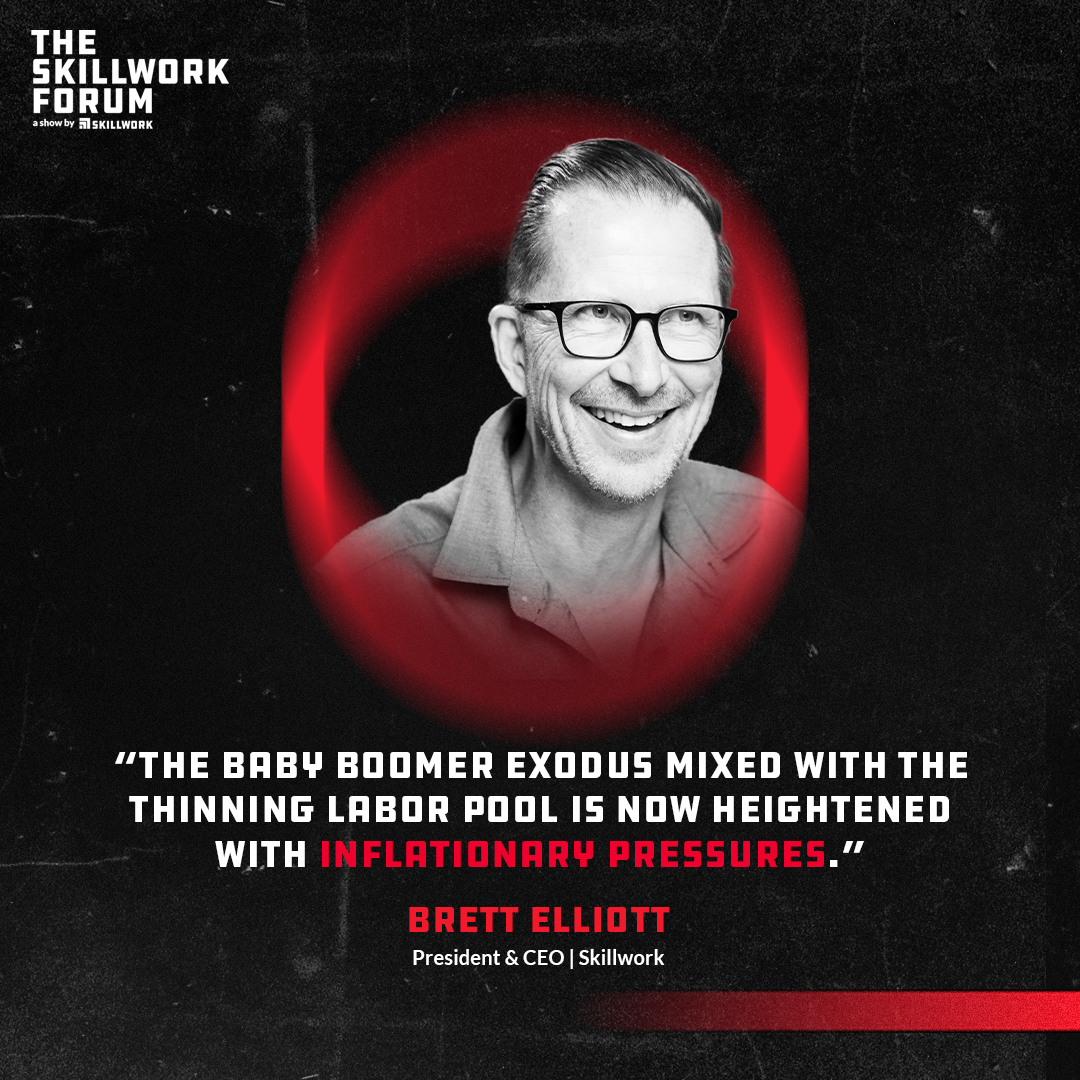
Tim Raglin 21:31
Yeah, so it's just a quote about that, as we were looking into this, the senior vice president of research and consulting at TransUnion, which just, full transparency, I have no idea what that is, but the guy sounded like, he knew what he was talking about. But I liked the quote, he said, "An optimistic consumer is more comfortable spending and borrowing." It's so easy. And the bottom line is, so here's a dichotomy that I always find strange too. So when consumer confidence goes down, people make wiser decisions in terms of they save rather than spend. But for the economy, we want people spending. So there is this people are sitting on money, and they're being a little less, a little bit more risk averse. So how did that impact your skilled trades? And why are we talking about it? Well, uncertainty drives pessimism. And pessimism affects people's attitude, affects their, you know, uncertainty in their job, willingness to transition to a new job, need for higher wages, and they're just not as focused day to day. So what does that impact things like safety? I mean, if I'm focused on paying bills, or how can I afford daycare, I mean, we deal with that with our employees, we're, we have to constantly be thinking about the impact of the economy to them, because we want our people engaged and thinking about what we're doing here. And, you know, they they can't if, if wages and inflation are killing them on the home front. So just to wrap this up, we're not economists, you know, we may use a couple of these phrases. We understand though, the wisdom and taking a measure of the society we're living in, from an economic perspective, and try to take a look at how that's gonna affect our business. And I'm sure you do as well. So, these trends, although we don't know how they're going to actually go, we don't know what in the world is going to happen with Russia, with Ukraine, global oil supplies. At this recording, you know, our administration is releasing, you know, a strategic oil surplus that we keep on hand supposedly, for, you know, crucial things. And evidently, a crucial thing is driving up my polling numbers, apparently, but...
Brett Elliott 23:44
Anything over $4 is crucial.
Tim Raglin 23:46
I guess so. But all in all, it pays to stay on top of it, and try to forecast it the best you can, get ahead of it, do risk mitigation strategy to look for ways to offset the risk. So any final thoughts Brett, on this? No, like you said, you know, we're not, you know, we're in this with you, whether it's as a business owner or somebody out there having to, you know, pay for gas, you know, so, you know, we just feel it from what we see. We have the advantage in that we have, you know, we work with you know, a lot of companies across the US, so we hear things we hear how companies are, are feeling it, we know, you know, our guys and gals that are out there that work for Skillwork here, which is our company, you know, they're out there on the road. So when you talk about gas, you know, you know, you know we're before it took a guy $100 to get to location to where he's going to work, now it's costing $150 or whatever the case may be. So we see it, we feel it. We know it's impacting these things. I think it's like anything, you know, ignoring a problem doesn't fix a problem. So we got to stay on top of it. We got to look at it, we got to look at wages, you got to make sure you keep your talent, you got to run your facilities more efficient than ever. And so I think that's, you know, that's really as we think into these things like you said, it's we don't have the answer for the for the war in Ukraine, we don't have the answer for a lot of these things, but we're common sense people. And so we're just looking at the impact in the trade world in the manufacturing, I guess we would say we do have the answer, which is, turn to God in times of uncertainty. Because even though, you know, we don't know what the future holds, we know Who holds the future. I love that and God's in control. So while we're, you know, good stewards, we don't become too anxious about these things that we can't control. So as we wrap up here, we just want to remind you again about our great friends at the Texas Boys Outdoors. We are a proud sponsor of that, it's on the Pursuit Channel. You can check them out on YouTube, outdoors, fishing, hunting, they focus on first responders, military, military veterans, special needs kids and adults, they do a great thing. We're proud to be a sponsor of that show and Brett recently went down and did a recording there you'll be able to see that soon with one of our skilled workers, and we're going down in a few weeks to do a hunting trip as well. And just get some of our guys that work hard out in the field down there to enjoy a great trip and God's great creation. So check them out. Pursuit Channel, Texas Boys Outdoors until next time, thanks for joining us here on the Skillwork Forum.
